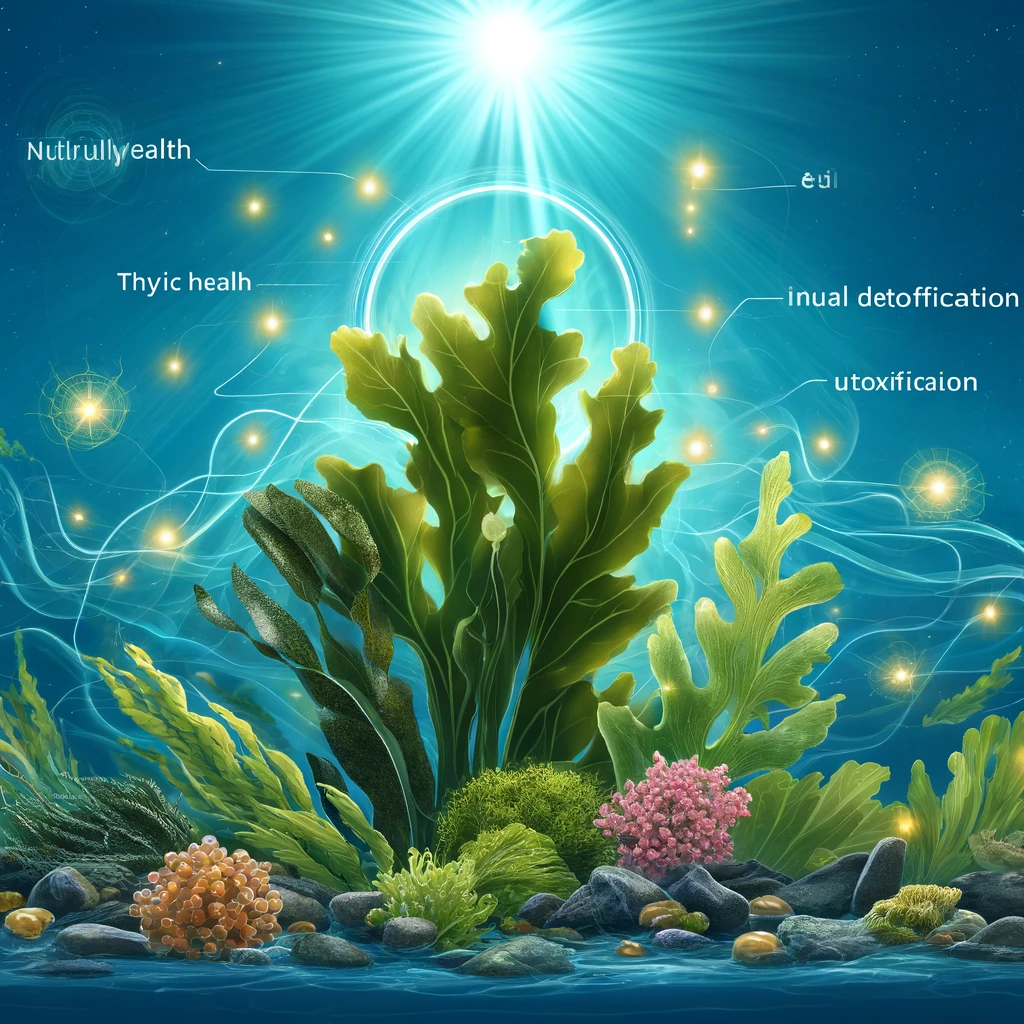
Seaweed and Marine Vegetables
Seaweed and marine vegetables offer a unique source of iodine, antioxidants, and essential minerals.
Kelp, nori, and wakame are rich in iodine and polyphenols, supporting thyroid function and cellular health.
Seaweed is also a sustainable superfood with minimal environmental impact compared to other crops.
Seaweed and Marine Vegetables
Introduction
Seaweed and marine vegetables are nutrient-dense superfoods that provide essential minerals, antioxidants, and unique bioactive compounds that support longevity and overall health. They are among the richest plant-based sources of iodine, aiding in thyroid function, metabolism, and immune health. This article explores the benefits of seaweed, its key nutrients, and the best ways to incorporate it into your diet.
Why Seaweed and Marine Vegetables Are Beneficial
1. Rich in Iodine for Thyroid Health
- Seaweed is one of the best natural sources of iodine, essential for producing thyroid hormones.
- Helps regulate metabolism, energy levels, and hormonal balance.
2. Supports Heart Health
- Contains fucoxanthin, a unique compound that may help lower cholesterol and blood pressure.
- High in omega-3 fatty acids, which reduce inflammation and support cardiovascular health.
3. Provides Antioxidants and Anti-Inflammatory Compounds
- Rich in polyphenols, flavonoids, and carotenoids, which combat oxidative stress.
- Helps protect against age-related diseases and cellular damage.
4. Enhances Gut Health and Digestion
- High in prebiotic fiber, which feeds beneficial gut bacteria and improves digestion.
- Contains alginates, which may protect the stomach lining and promote gut balance.
5. Boosts Bone Health
- Provides calcium, magnesium, and vitamin K, essential for strong bones.
- Reduces the risk of osteoporosis and bone density loss.
Best Types of Seaweed and Marine Vegetables
- Nori: Used in sushi, rich in iodine and protein.
- Kelp: Excellent source of iodine, used in soups and broths.
- Wakame: High in fucoxanthin, supports metabolic health.
- Dulse: Contains iron and antioxidants, often eaten as a dried snack.
- Kombu: Common in Japanese cuisine, used to enhance umami flavors.
- Spirulina & Chlorella: Blue-green algae high in protein, chlorophyll, and antioxidants.
How to Incorporate More Seaweed into Your Diet
- Add Nori Sheets to Wraps and Sushi Rolls
- Sprinkle Dried Seaweed on Salads and Soups
- Use Kelp Noodles as a Low-Carb Pasta Alternative
- Mix Spirulina or Chlorella into Smoothies
- Make Miso Soup with Wakame or Kombu Broth
Potential Downsides and Considerations
- Excess Iodine Intake: Overconsumption may disrupt thyroid function.
- Heavy Metal Contamination: Choose organic, lab-tested seaweed to avoid exposure to pollutants.
- Sodium Content: Some varieties are naturally high in sodium and should be consumed in moderation.
Conclusion
Seaweed and marine vegetables are among the most nutrient-dense foods on the planet, offering powerful health benefits for thyroid function, heart health, and digestion. Incorporating a variety of these marine superfoods into your diet can enhance longevity and overall well-being. By consuming seaweed in moderation and choosing high-quality sources, you can harness its full potential for optimal health.
Unlock Your Potential with Biomarker, Nutrition and Activity Tracking
Understanding your biomarkers is key to optimizing your health. NOVA's clinics, team and AI-driven platform seamlessly ingest and analyze this data to provide personalized coaching tailored to your unique performance goals.
FAQs
Seaweed provides iodine for thyroid function and antioxidants that help protect against cellular damage.
Excess iodine from too much seaweed can impact thyroid function, so moderation is key.
Still have questions?
Book a consult to meet with one of our health experts
Launch Your Health Journey Today
Unlock your potential with our coaching and AI platform that personalizes your health goals and provides daily coaching. Start your journey towards a healthier you and experience the difference.
